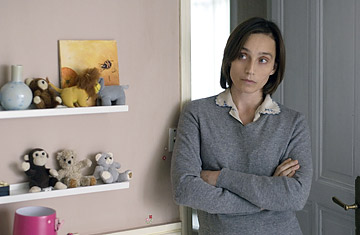
I''VE LOVED YOU SO LONG, (aka IL Y A LONGTEMPS QUE JE T''AIME), Kristin Scott Thomas,
Pale and plainly dressed, a woman we will soon come to know as Juliette (Kristin Scott Thomas) sits alone in soulless airport waiting room. She expresses no visible emotions, and maybe she is too stunned to feel any. It's also possible that she is feeling so many emotions, and that they are so contradictory, that she cannot respond to any of them except with puzzled silence.
So begins I've Loved You So Long, a finely modulated and totally absorbing first film by Philippe Claudel, who is better known, at least in France, as a novelist. In a few minutes her sister, Léa (Elsa Zylberstein), arrives to conduct Juliette to what amounts to her new life — as a guest in Léa's home, which consists of Luc, her grumpy husband, two adopted daughters and Luc's father, who is unfailingly cheerful despite the fact that a stroke has rendered him mute. It's an inherently awkward situation, rendered much more so by the fact that Juliette has just been released from jail, where she served 15 years for an unspecified but obviously heinous crime.
What ensues is a regeneration drama, but unlike many movies in that often sentimental and melodramatic vein, its scale is modest and understated. Juliette needs a job. She also needs an apartment of her own. And perhaps (she hardly dares think about this), a man. But she's a marked woman. None of these goals are easy for an ex-con to attain. That's especially true of Juliette, who is obviously intelligent — in her former life, we learn, she was a highly respected doctor — but also inarticulate, unable to defend herself against a casually cold world.
A few grace notes, however, begin to sound softly in her life. Her parole officer is notably sympathetic to her. Her nieces are chipper and accepting of her — and they occasionally ask her the direct questions about her past that the adults prefer not to bring up. The speechless grandfather establishes a benign connection, mainly through the love of reading he shares with Juliette. A man even appears — patient, unglamorous and someone who, like Claudel himself, has worked in prisons and understands the devastation that long-term incarceration can cause. Most important, there is Léa. It is she who has loved Juliette so long and who is determined to bring her back to the land of the living. She is intelligent, but she has the good sense not to boldly assert it. She just goes swimming and shopping with her sister, in effect showing her the simple pleasures of the quotidian — of not succumbing to self-pity, of taking responsibility for modest, restorative actions. She is very well and unsentimentally played by Zylberstein.
But it is Scott Thomas's work on which the success of the picture depends and she does not fail it. Indeed, she gives a truly great performance. It's never easy for an actor to sustain our sympathy when a role is grounded in radical passivity. But she conveys in I've Loved You So Long's opening sequences a sense that her silences are willed attempts to protect herself from her own guilt at the crime — I don't think it spoils anything to identify it as a mercy killing — for which she has paid her debt. She is not quite dead, but she is in need of life support, and when she gets it, in minuscule increments, her response is extremely delicate — not quite hope, but not quite bitter rejection.
Her performance is about small, believable, human gestures which sometimes fail, sometimes succeed, but eventually restore Juliette to something like life. A modest victory that is not presented triumphantly. I have heard this criticism advanced about the movie: that Claudel holds back from the audience the crucial information that Juliette's crime was morally defensible, which implies that calumny she suffers for it is indefensible, or at least too crudely judged. I think otherwise. This is not a movie about setting an injustice to rights. It is more profoundly about Juliette coming to grips with herself, freeing herself from her own guilty questions about her past behavior. What she has to learn is that she has been given a second chance and must accept it. It is a privilege to watch Scott Thomas work that out, subtly and realistically, in a film that remains stubbornly true to the modest presentation of psychological issues that are deeper and more potentially melodramatic than it ever overtly allows them to be. It is this discipline that frees I've Loved You So Long from the "feel good" category and encourages us to feel something much deeper about it the life it records.
